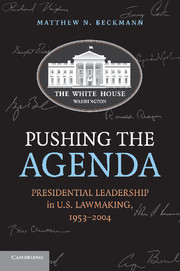Book contents
- Frontmatter
- Contents
- Dedication
- Figures
- Tables
- Acknowledgments
- 1 Introduction
- 2 A Theory of Positive Presidential Power
- 3 Case Study: Pushing President Bush's 2001 Tax Cut
- 4 Winning Key Votes, 1953–2004
- 5 Signing New Laws, 1953–2004
- 6 The Practice and Potential of Presidential Leadership
- Appendix: Archival Study Technical Details
- References
- Index
6 - The Practice and Potential of Presidential Leadership
Published online by Cambridge University Press: 05 June 2012
- Frontmatter
- Contents
- Dedication
- Figures
- Tables
- Acknowledgments
- 1 Introduction
- 2 A Theory of Positive Presidential Power
- 3 Case Study: Pushing President Bush's 2001 Tax Cut
- 4 Winning Key Votes, 1953–2004
- 5 Signing New Laws, 1953–2004
- 6 The Practice and Potential of Presidential Leadership
- Appendix: Archival Study Technical Details
- References
- Index
Summary
The U.S. presidency occupies a special place in American politics. The office's extraordinary prestige is rivaled only by its distinguished pedigree. George Washington, Thomas Jefferson, Abraham Lincoln, and Franklin Roosevelt are more than predecessors; their monuments also reside mere blocks from the Oval Office. Is it any surprise that lofty expectations await those who serve in their shadow?
Unfortunately for today's occupants, the contemporary White House's legislative arsenal does not match its policy expectations. The Constitution simply does not provide the president any durable means for inducing legislators to consider his agenda, let alone pass it; and neither public opinion nor party ties can easily override that basic institutional setup. No wonder even the mild-mannered, generally successful President Eisenhower once snapped, “The selfishness of the members of Congress is incredible…. They are just about driving me nuts” (27 July 1954).
Considering the imposing obstacles presidents face when pushing legislation, one might wonder why today's chief executives continue making the effort. Are they just tap dancing before a demanding citizenry, or do presidents really think they can make a difference?
I have argued that presidents sincerely believe that their efforts matter, and I view this book's core contribution to be not just proving them right but also explaining why they are. The seminal discovery here is that presidential–congressional interactions in the earlygame are not ancillary to those in the endgame but rather provide a distinct and important decision-making venue.
- Type
- Chapter
- Information
- Pushing the AgendaPresidential Leadership in US Lawmaking, 1953–2004, pp. 150 - 162Publisher: Cambridge University PressPrint publication year: 2010



